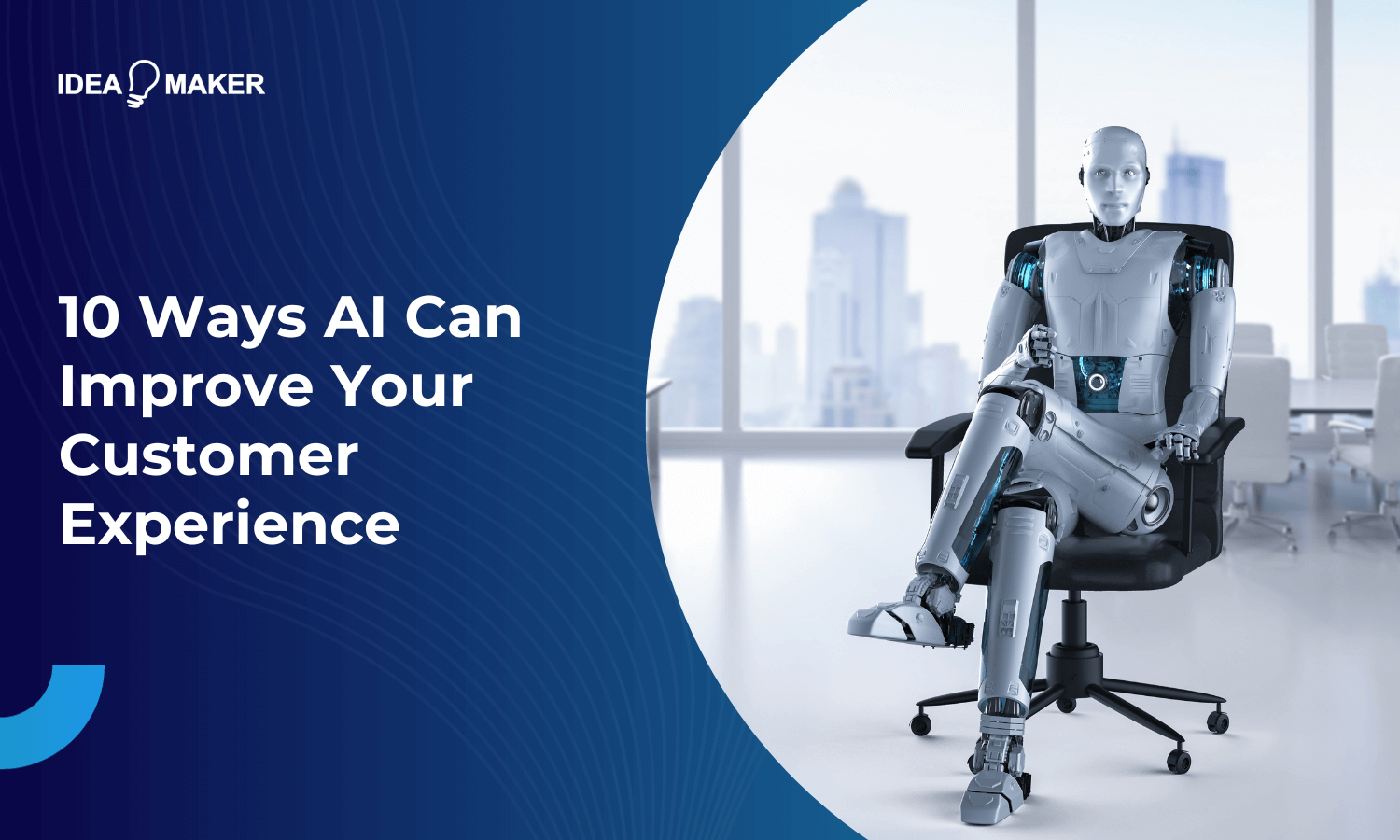Table of Contents
The evolution of digital marketing is propelling the customer experience into a pivotal role, influencing brand retention, customer loyalty, and overall business performance. Now, with the rise of artificial intelligence, it’s easier than ever for businesses to improve the customer experience and increase lifetime value.
From advanced personalization to automation, this article explores ten of the most remarkable ways AI is reshaping the customer experience. Keep reading to learn more about how you can leverage this powerful technology to better understand your customers and ensure optimal satisfaction.
Understanding AI in Customer Experience
Thanks to its many capabilities, AI has the potential to catapult any business’s customer satisfaction to unprecedented levels. However, before embarking on this exploration, let’s first establish a clear understanding of the technology in the context of customer experience.
AI refers to smart computer systems or machines designed to handle tasks typically associated with human thinking and understanding. By combining a wide range of technologies, such as machine learning, natural language processing, robotics, and computer vision, AI offers a spectrum of capabilities crucial for optimizing the customer experience. These include:
- Machine Learning Algorithms: These algorithms continuously enhance their performance through experience and new data, enabling AI systems to dynamically adapt to changing customer behaviors and needs over time.
- Natural Language Processing (NLP): Using NLP, AI chatbots and virtual assistants can comprehend and respond to customer queries and requests in a conversational manner.
- Sentiment Analysis: By analyzing customer conversations, sentiment analysis helps companies gauge satisfaction levels and pinpoint areas for improvement in their services.
- Predictive Analytics: Leveraging data patterns, predictive analytics enables businesses to forecast customer needs and predict future behaviors, such as identifying potential repeat purchases or assessing churn risk.
- Personalization Engines: These engines use data regarding purchase history and browsing behavior to recommend relevant products and tailor experiences, providing customers with a more personalized journey.
With these valuable capabilities, it’s no surprise that research from MIT Sloan Management Review reveals that a whopping 85% of companies expect AI to bring about a substantial change in their customer experience within the next five years.
However, as the practice of using AI to elevate the customer experience evolves, it is becoming imperative for businesses to use it to offer personalized and proactive customer experiences. Pioneering companies like Amazon, Netflix, and Spotify exemplify the transformative impact of AI-driven recommendations and customization in creating a superior customer experience.
10 Customer Experience Implementations With Artificial Intelligence
Now that you have a better understanding of AI’s capabilities, let’s take a look at the top 10 uses of the technology to improve your customer experience.
-
Personalized Recommendations
One of the most effective ways AI can enhance customer service is by recommending the right products to the customer. For this, sophisticated machine learning algorithms analyze individual customer preferences, demographics, browsing history, and purchase data to provide ultra-tailored product or content recommendations.
By suggesting relevant items aligned with each customer’s taste, businesses can significantly boost their conversions, especially seeing as how 63% of consumers are more likely to purchase from brands that personalize their shopping experience.
A good example of this is Netflix’s film recommendation system, which leverages AI to study viewing behaviors and suggest new shows and movies that each user is most likely to enjoy.
-
Automated Customer Support
In the era of customer service evolution, AI-powered chatbots and virtual assistants emerge as the front-runner of automated support options, offering 24/7 assistance to promptly address customer inquiries. These chatbots play a pivotal role in improving satisfaction, while also alleviating support demands on human agents.
By handling routine tasks like password resets, appointment changes, balance checks, and order status lookups through natural conversation, chatbots deliver quick and convenient issue resolution. A ride-hailing platform like Uber, for instance, could use chatbots to assist users in tracking rides, addressing rider and driver concerns, estimating ride fares, and processing requests and cancellations.
As you can see, AI chatbots are much more than just a support tool—they are revolutionizing customer interactions by replacing traditional FAQ pages and enhancing human-agent collaboration.
-
Real-Time Data Analysis
Harnessing instant data processing capabilities, AI empowers businesses to access customer insights and predict needs in real-time to offer context-specific recommendations and unparalleled personalization.
Consider the scenario of call center agents using AI during a customer call. As the conversation unfolds, AI can analyze the customer’s history on the spot, providing agents with the ability to upsell relevant offers or provide troubleshooting steps tailored to that individual’s unique situation.
This means that, with AI-driven real-time data analysis, businesses can properly anticipate customer needs and foster a seamless and personalized engagement experience that sets them apart in the competitive landscape.
-
Enhanced User Interfaces
One of the most notable software development trends of 2024, an AI-enhanced user interface has the potential to elevate the user experience to new heights of convenience. For this, natural language processing, predictive text capabilities, and voice recognition converge to redefine interactions across websites, mobile apps, voice assistants, and various interfaces.
The result is an interface that’s intuitive, responsive, and tailored to individual preferences, marking a paradigm shift in how users engage with technology and making interactions more natural, efficient, and enjoyable.
Starbucks’ Deep Brew is the perfect example of how an enhanced user interface can provide a better customer experience. The AI-driven platform not only customizes interactions across multiple channels, including the Starbucks app, it also uses predictive analytics for machine maintenance. This provides insights into consumer preferences and optimizes personalization in service delivery.
-
Predictive Customer Behavior Analysis
Another effective way of leveraging AI to improve the customer experience involves using the capabilities of the new technology to identify customer behavior trends. By analyzing patterns in transactional data, usage metrics, and survey responses, AI models can forecast behaviors like repeat purchases, risk of cancellation, and reactions to new offerings.
The ability to accurately predict customer intent is invaluable for businesses, as it enables companies to convert 20-30% more prospects compared to non-predictive methods. Simply put, identifying potential pain points in advance helps businesses retain more customers.
For example, an airline could use predictive analytics to estimate how price changes or flight time adjustments would influence demand for various routes. Meanwhile, a subscription company could analyze usage data to identify customers likely to cancel based on declining engagement, then proactively offer incentives to retain them.
-
Efficient Problem Solving
Sophisticated machine learning algorithms empower organizations to identify common customer problems, complaints, and pain points with precision, transforming the overall problem-solving approach. By adeptly detecting patterns within vast datasets, businesses can proactively implement systemic solutions, preventing issues from escalating or recurring.
The strategic application of AI for customer engagement becomes evident in scenarios such as tracking common technical issues faced by users of a software app. Armed with insights from AI, a company can embark on a redesign journey, streamlining complex features that frequently cause confusion.
Similarly, in the hospitality industry, a hotel can analyze guest complaints through AI-driven processes, leading to targeted upgrades in amenities that address the most negative feedback. This systematic approach, facilitated by AI, ensures continuous optimization of the customer experience, turning potential challenges into opportunities for improvement.
-
Customized Marketing Strategies
With the capability to analyze demographics, interests, behaviors, and geographic data, AI allows organizations to create finely tuned customer segments. When integrated with predictive analytics, this dynamic duo becomes a potent tool for crafting highly targeted digital marketing and ad campaigns that resonate with specific market niches.
For instance, by leveraging AI-powered customer engagement, a restaurant could send enticing happy hour specials directly to young professionals in the neighborhood every Friday afternoon. The result is a personalized and resonant messaging strategy that captures the attention of each unique audience, highlighting the transformative impact of AI in fostering a deeper connection with customers.
By aligning seamlessly with customer interests and contextual relevance, this strategic approach not only boosts response rates and return on investment (ROI), but also lays the foundation for a more meaningful connection with the audience.
-
Improved Customer Feedback Analysis
AI has become a pivotal tool for customer feedback analysis, reshaping the way businesses derive valuable insights from diverse sources. Here, natural language processing (NLP) takes center stage, enabling the rapid analysis of vast amounts of unstructured text data. Then, through sentiment analysis key themes and actionable insights can be properly identified to enhance products and services.
Unlike traditional methods of merely tallying survey scores, AI brings a human touch to the analysis, covering the nuances of customer expressions. By decoding the deeper meaning embedded in feedback, AI empowers human teams to comprehend the intricacies of how customers describe their experiences. This approach becomes instrumental in pinpointing specific areas for improvement, fostering a more nuanced and customer-centric decision-making process.
-
Enhanced Security Features
In the past year alone, artificial intelligence has prominently positioned itself as a powerful ally to any business, introducing advanced biometric security features like facial recognition, voice ID, and fingerprint authentication. In addition to enhancing your data security, these features also help deliver seamless, personalized experiences for your customers.
As an example, banks use AI to analyze usage patterns, flagging suspicious transactions and fortifying defenses against fraud. In the broader cybersecurity landscape, AI acts as a vigilant guardian, swiftly detecting and neutralizing potential risks, to ensure a secure and trustworthy digital environment.
-
Streamlined Operational Efficiency
Applying robotic process automation and AI to repetitive tasks, such as billing, reporting, data entry, and scheduling, helps businesses optimize administrative processes. As a result of this efficiency, staff are able to focus more on providing excellent customer support, leading to cost savings of 20-40%.
As an example of how AI can improve customer experience, AI chatbots could automatically input customer request details into CRM systems rather than agents manually typing this data. Intelligent inventory tracking apps can also automatically reorder products when stock runs low, ensuring more attentive customer service.
Final Thoughts
This overview demonstrates the remarkable versatility of AI in optimizing customer satisfaction across the entire customer journey, from personalized recommendations to automated support.
Yet, while AI excels at data-driven tasks, human connection remains invaluable. Consequently, the most successful customer experience strategies artfully combine AI capabilities with the irreplaceable emotional intelligence of humans.
If done properly, integrating AI will ultimately allow you to know your customers and meet their needs seamlessly across channels. However, in order to realize the technology’s full potential, finding the right partner is crucial. That’s where Idea Maker comes in.
Implement AI in Your Customer Experience With Idea Maker
With deep expertise in AI development, Idea Maker creates tailored solutions to solve your specific business challenges. Our technical specialists can assess your needs, design strategic implementations, and deliver customizable AI capabilities on time and budget.
Whether you need AI chatbots, predictive modeling, process automation, or anything in between, Idea Maker has the experience to make it happen. Our focus on ethics and transparency ensures responsible AI that earns customer trust.
AI may be a budding new technology, but you should not wait too long to take advantage of it. Set up a free consultation with Idea Maker today to explore how custom AI solutions can strengthen engagement, efficiency, and growth of your brand.










